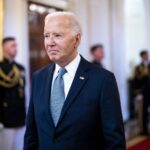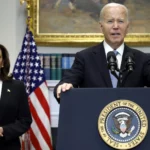In the long contest ahead with Russia and China, U.S. military power will be of greatest importance, but non-military instruments of power will be essential to our ability to compete and win as well. The most crucial such instrument is economic, the importance of which is widely recognized, as both the executive branch and Congress work to promote strong growth and technological superiority.
We have, however, seriously neglected other instruments of power that were fundamental to winning the Cold War: telling our story to the world, telling the truth to populations of countries ruled by authoritarian governments and exposing disinformation spread by those same governments.
Strategic communications and engagement with foreign publics and leaders are essential to shaping the global political environment in ways that support and advance American national interests. In this crucial arena of the competition, however, Russia and China are running rings around us.
Russia’s militarized bid to reverse the Cold War verdict and resurrect its empire has relied heavily on propaganda and disinformation to spread false narratives among its own people and those outside its borders, as well as to undermine the West’s coherence and resolve. Because Russia has no positive narrative to offer, its strategic communications aimed at other countries mainly attack the United States and the West, and serve as spoilers intended to disrupt and divide.
China has taken a far more comprehensive approach. It has built an extraordinary global strategic communications and foreign influence operation, committing huge sums of money to building a modern media apparatus aimed at domestic and world audiences. China’s Xinhua News Agency has nearly 180 bureaus globally (and there is not a single country on the planet that is not reached by one or more Chinese radio, television or online outlets). Chinese companies buy stakes in domestic media outlets in numerous countries, especially in Africa, Latin America and parts of Asia. Chinese TV and radio broadcasts, websites and publications are readily available in the United States, but there is no reciprocity in China. More than 500 Confucius Institutes, ostensibly established to promote Chinese language and culture, spread China’s message around the world. The scale of the overall endeavor and multiple mechanisms used are without parallel.
In stark contrast, the United States after the Cold War largely dismantled its strategic communications and engagement capabilities. The U.S. Information Agency, our primary instrument to engage foreign publics throughout the Cold War, with a presence in 150 countries, was eliminated in 1999. Parts of it were parceled out to the State Department, and most of our know-how and key structures for engaging foreign publics were left to atrophy. The lack of priority attention to American strategic communications and engagement over the years is demonstrated most vividly by the fact that the undersecretary position in the State Department charged with overseeing these efforts has not had a Senate-confirmed occupant 40 percent of the time since it was created in 1999 and 90 percent of the time under Presidents Trump and Biden.
U.S. strategic communications and public diplomacy are fragmented among 14 agencies and 48 commissions. Yet, the State Department, which ought to be driving this train, lacks not just necessary resources in dollars and people but also, importantly, the authority to coordinate, integrate and synchronize these disparate and unfocused efforts. Further, there is no government-wide international communications and engagement strategy, and certainly no sense of urgency. In short, the country that invented public relations is being out-communicated around the world by an authoritarian Russia and increasingly totalitarian China.
Our approach must be different from theirs. Our advantage over the Soviet Union in strategic communications during the Cold War was that the USIA and our radio broadcasters such as Voice of America simply told the truth. We must continue to do so. However, in those days we had eager audiences in the U.S.S.R. and Eastern Europe. The global audience today is more skeptical, so we must develop new approaches to effectively deliver our message.
The solution is not to re-create the USIA — the world has moved on. But a number of measures can be taken to dramatically improve the current lamentable state of affairs, some strategic, others operational. Many of them the president could implement immediately, while others would require congressional action.
First and foremost, the White House and State Department should develop a global engagement plan for strategic communications to explicitly advance U.S. national security interests. This plan should include a road map for engagement with foreign publics and leaders focused especially on sub-Saharan Africa and Latin America. Underpinning this plan should be a significant expansion of people-to-people exchange programs that send American musicians, sports figures and artists abroad and bring foreign college students to the United States, with government support for private efforts in these areas.
Further, we need more aggressive efforts to breach the digital communications firewalls that allow China and Russia to propagate false narratives within their borders unchecked by independent views. We should also allocate additional resources to the State Department’s Global Engagement Center, the organization responsible for unmasking and discrediting foreign disinformation. These measures, among others, would give focus to our strategic communications efforts.
Operationally, the Senate should quickly confirm Elizabeth Allen, the president’s nominee for undersecretary of state for public diplomacy. The president should empower the secretary and, specifically, this undersecretary of state to synchronize the foreign strategic engagement efforts of all elements of the executive branch — including the Defense Department, which spends many times more on these programs than the State Department but is disconnected from our diplomatic strategies. Biden should also appoint a senior National Security Council official with responsibility (and authority) to ensure that strategic communications are an integral part of every NSC decision-making process. The president and Congress need to ensure that the secretary of state is empowered to provide broad strategic guidance to the Agency for Global Media, which manages all U.S. foreign broadcasting. Finally, our allies have their own strategic communications capabilities, and we need new efforts to coordinate our mutual capabilities, perhaps through a new office at NATO.
But that’s just a “starter set” of actions. More will be needed to strengthen this critical instrument of American power — an instrument that was essential to our success in the Cold War and will be even more important in the global contest that lies before us.
Source : The Washington Post















